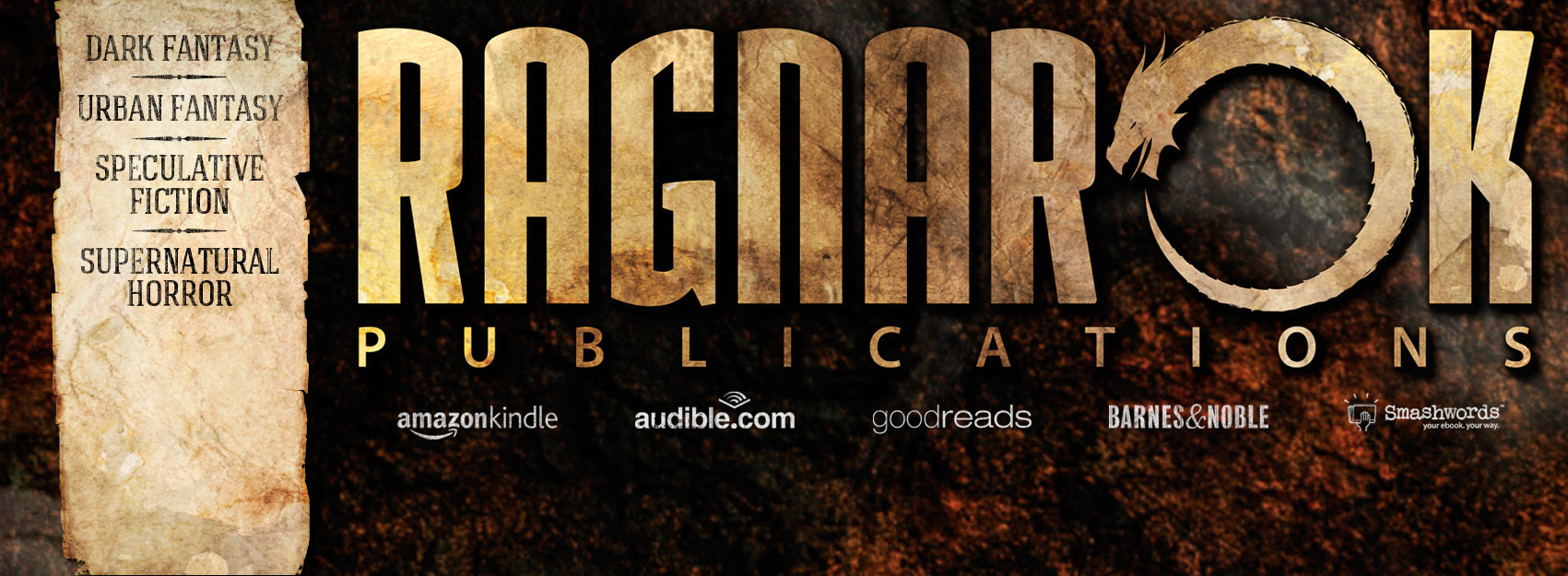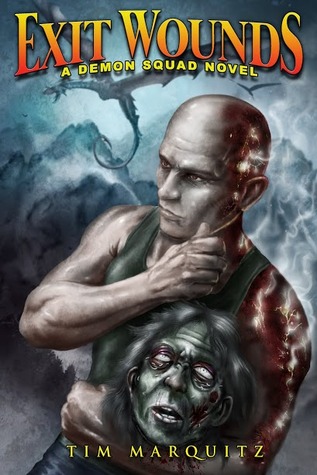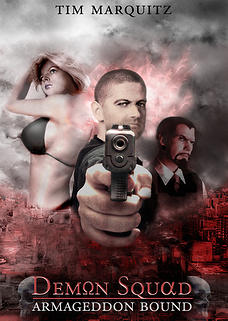 Tim Marquitz, Editor and Chief of Ragnarok Publications, recently released Exit Wounds: Demon Squad #7. Not many people have written a series that long (and it’s not his only one – Dead West is sweet zombie action). It’s an honor to have him come on and share with us what he’s learned. He also has a sweet giveaway to offer:
Tim Marquitz, Editor and Chief of Ragnarok Publications, recently released Exit Wounds: Demon Squad #7. Not many people have written a series that long (and it’s not his only one – Dead West is sweet zombie action). It’s an honor to have him come on and share with us what he’s learned. He also has a sweet giveaway to offer:
- $40 Gift Card to Amazon, B&N, or Starbucks (winner’s choice)
- The entire seven book Demon Squad series (e-book)
- 3 e-copies of Armageddon Bound (BK 1 of Demon Squad)
This contest/giveaway ends on September 1st, 2014.
Click here to participate in this contest/giveaway:
 On Tim’s blog post at Dark Heroic Fantasy, he gave five lessons he learned writing Exit Wounds. I’d like to ask him some questions based on those points.
On Tim’s blog post at Dark Heroic Fantasy, he gave five lessons he learned writing Exit Wounds. I’d like to ask him some questions based on those points.
Point 1. Evolution is a must…but not too much, mind you.
How do you keep this evolution from being predictable? Sure, you don’t make it too much or too soon, but in a series as large as yours I wonder if there was a pattern you were trying to avoid.
TM: To keep things from becoming predictable, you need either an unpredictable protagonist or an unpredictable world; preferably both in conjunction. If your main character is a farm boy in a fantasy tale, folks are generally going to assume he’s destined for greatness, to become the king or emperor or whatnot. The standard trope. But what if he’s gay in a world that loathes homosexuality, or he’s crippled, or of a hated religion, or he simply doesn’t want to be king? What if men aren’t allowed to rule? Just by introducing factors outside of the general reader expectation, you’ve already kicked predictable to the curb.
On top of these kinds of adjustments, it makes sense to sit down and create a kind of underlying development that you want for the character. With regards to the Demon Squad, there’s a sub-surface development of the main character, Frank, that I use to shift perception. That’s his personal maturity. While he’s fighting aliens and demons and angels and everyone expects him to rule over Hell and become Lucifer, my expectations of him are smaller scale. This is where the character surprises folks. The grand plans are still there, however, because of the plot lines that force him to mature or devolve throughout the series, I can still surprise the reader with how he might react, how he’ll deal with something. Combine that with a chaotic world and spread it across a long series and readers will have a harder time determining what’s expected of the character.
Point 2. Originality is a burden not everyone appreciates.
“Genre boundaries often exist as a guideline for the readers as much as they are a border for authors. It’s okay to dabble across the line, but step too far and you’ll lose folks.”
What is an example of a genre boundary that you had to be careful with in the Demon Squad series, and how did you keep from going too far over that line?
TM: For me, romance is a big no-no. While there is certainly some in the series, it’s subdued and kept in its place because it would upset the balance of the story. It’s cool that Frank falls in love and that foments a reaction, it’s not the primary aspect of the series. I feel my readers would walk away from the series if I went that route because it’s so contrary to the main character’s personality.
As for other aspects, I’ve introduced aliens into the Demon Squad and had one reader declare it was too much. Stylistically, I don’t think it was any less believable than angels and demons and mythical creatures, but it is one instance where that shift in the perceived genre—however loosely it can be described—affected someone. I’d crossed the line of that person’s ability to suspend disbelief.
In the end, readers come to a book because of their perception as to what it’s about. After reading the first book in the series, the author has, to a certain degree, defined the expectations of the readers. You can add in different flavors to taste, but once you dump in a single ingredient in large quantities, you’ve changed the taste of the series and you’ll chase people away.
Point 3. Subtlety is often your enemy.
I lean toward subtlety as well, fearing making any character evolution come across like a lesson I’m trying to teach. Is that what you’re afraid of when you choose subtlety? Maybe you were referring more toward not hinting too strongly on how the plot would end up. How do you think you’ve learned to be subtle without losing the reader?
TM: No, not really. My writing style is very entertainment-based. I’m never looking to impart anything to the reader. I want them to have a good time and come back for seconds, but that’s it. What I meant was more that I feel foreshadowing the plot puzzle might need to be a little more apparent than I generally do.
An old, unpublished story of mine had a vampire-type creature who was capable of infecting humans if the human ingested vampire blood. I had a scene where the vampire killed a character on screen, a single line of description showing the vampire’s blood splattered across the victim’s face, lips, his mouth open, but that was it. Then a handful of chapters later the supposedly dead human reappears. All of my readers went, “Huh?”
While the plot point had been shown, it was too subtle for them to catch. There hadn’t been enough instances of foreshadowing perhaps for the reader to catch on to what had happened. I think hinting more as to the nature of the blood and its effects on humans earlier in the book would have alleviated that particular confusion.
Point 4 is so good I’m not sure I have a question, so I’m just going to share it with folks:
4. It’s okay to take a step back if your next is two steps forward.
“Retreat IS an option. For me, writing the Demon Squad is a fairly linear task, each book building on the previous in an effort to eventually create a satisfying conclusion to the series. That said, you can’t just ramp up story after story, each building tension, and never have it break. That works for trilogies and standalones, but a series requires an ebb and flow of high and low, of action and introspection, of redemption and failure. Not every book can ratchet the series up in the same way, with the same intensity. It’s okay to take it down a notch, make a story less impactful upon the world and more personal to the character, but always bring it back up. Life is a roller coaster, full of dips and climbs and sudden falls. Your story shouldn’t be any different.”
Again, Point 5 is great:
5. Go your own road.
“While I mentioned earlier that originality is a burden, there is, and always will be, only one of you. While few appreciate a work so original it becomes a chore to comprehend, always—always—let yourself bleed onto the page. In the end, it’ll be your voice that makes the difference between a reader settling in or putting your book back on the shelf. Make everything you write a part of yourself, bring your experience and voice and loves and hates to your work, and people will gravitate to the honesty on the page.”
If someone asked me how I developed my voice I’d maybe scoff and say, practice a lot. It’s just something that happens over time and lots of writing. Across the series that you’ve written, how is Demon Squad unique from and similar to the overarching Marquitz voice?
TM: You’d be right though. It is all about practice, becoming comfortable with the words that fall out of your head. Until you’re comfortable, what you write will never truly be you. That comfort comes in the form of experience.
For me, the Demon Squad is unique from my other works because it’s written in a style that is close to my own attitude and viewpoint in a way that no other story is. Mind you, I’ve removed a number of aspects such as politeness and political correctness from the story and have ramped up the quirks to full blown mania in many cases. Sitting down to write a Demon Squad story is often an experience of me asking what I could get away with if I didn’t have to answer to the world. Because of that freedom, the DS books are way more in the reader’s face than my other writing, and intentionally so.
[Start reading Demon Squad with To Hell and Back: A Demon Squad Collection (DS 1-3)]
In most of my other work, I try to create a style that is a little more literary. By that I mean, the prose is a little nicer, more refined; the visualizations are less crude than they are through Frank’s point of view. There’s more of a poetic flow to the words rather than the stream of consciousness type narration that happens in the Demon Squad.
That said, I think style is defined by the piece you’re writing, the character you’re voicing. The mechanical aspects of style remain the same throughout my stories, but the voice changes based on what I need to get across within that particular story. I will structure paragraphs and sentences similarly between all my works, but it is the viewpoint of the character that ultimately decides how I’m going to write it stylistically. As such, the Demon Squad books are certainly my voice, but so are my other works. You might just have to look a little harder to catch the Marquitz framework.
——————————-
 Tim Marquitz is the author of the Demon Squad series, the Blood War Trilogy, co-author of the Dead West series, as well as several standalone books, and numerous anthology appearances including Triumph Over Tragedy, Corrupts Absolutely?, Demonic Dolls, Neverland’s Library, and the forthcoming No Place Like Home, Blackguards, and Neverland’s Shadow.
Tim Marquitz is the author of the Demon Squad series, the Blood War Trilogy, co-author of the Dead West series, as well as several standalone books, and numerous anthology appearances including Triumph Over Tragedy, Corrupts Absolutely?, Demonic Dolls, Neverland’s Library, and the forthcoming No Place Like Home, Blackguards, and Neverland’s Shadow.
The Editor in Chief of Ragnarok Publications, Tim most recently compiled and edited the Angelic Knight Press anthologies, Fading Light: An Anthology of the Monstrous and Manifesto: UF, as well as Ragnarok Publications’ Kaiju Rising: Age of Monsters.
Web Presence:
https://www.facebook.com/tim.marquitz
https://twitter.com/Marquitz
http://tmarquitz.com/blog/
—————————————————————————————————————————————————
 Timothy C. Ward
Timothy C. Ward
Executive Producer

Timothy C. Ward has been podcasting since 2010, first as AudioTim, and now with AISFP. His newest story, Scavenger: A Sand Diver Tale
, is available on Kindle for $.99. His novel in progress, Order After Dark, is a Post-apocalyptic Fantasy set in the rift between Iowa and the Abyss. Sign up to his author newsletter for updates on new releases.
Subscribe to Adventures in SciFi Publishing podcast on: iTunes | Stitcher Radio (Android users) | RSS | Website RSS | Newsletter (Subscribers are entered on giveaways)


















Speak Your Mind